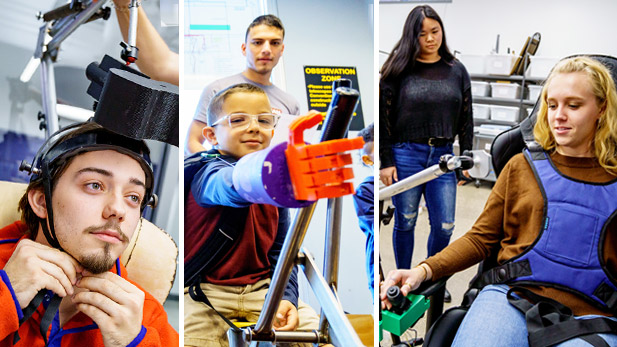Customized Biomedical Engineering Program Designed for Students’ Success

A variety of hands-on design projects allow Biomedical Engineering students to learn technical and professional skills throughout their college careers that they apply to relevant project-based challenges.
After learning elements of design thinking, materials, instrumentation, and research through the department’s classroom, laboratory and internship experiences, Biomedical Engineering graduates fully comprehend and appreciate the skills they develop that provide medical devices and procedures to improve people’s quality of life.
An extensive design component, starting in the student’s first academic quarter, is a core program feature. Other elements include communication and leadership development, along with background in regulatory affairs and physiology – all led by a skilled and caring faculty and staff.
And it all culminates with unique customized coursework that aligns with students’ career goals. For instance, those interested in entrepreneurship could take a variety of engineering management courses. Others wishing to emphasize neural engineering could take courses in robotics and mechanical engineering, while those wanting to expand their horizons in tissue engineering could study biochemistry and material science.
“We’re empowering students to set their own course and craft their own adventures to realize their personal goals and career aspirations. It’s all about the journey that a student wants to take,” says Associate Professor Bill Weiner, PhD. He adds that each Advanced Individualized Mission area of concentration must be approved by a department faculty committee.
Noah Woodson, a 2023 program graduate, studied manufacturing design, Six Sigma principles and quality methods after completing a summer internship with Boston Scientific. He has returned to the company to begin his career. studied manufacturing design. Classes in tissue engineering, biostatistics and biosignal processing helped prepare recent graduate Blake Deckard to work in toxicology with Paustenbach and Associates.
Meanwhile, junior Noor Abufares is spending this summer as an Engineering Fellow, specializing in computational medical imaging and therapy technologies, at Washington University of St. Louis; 2023 graduate Luci Duncan is pursuing a doctorate in applied biomedical engineering, specializing in neural science, from Cleveland State University; and senior Kylie Rathbun is contributing to a National Science Foundation-sponsored Research Experiences for Undergraduates program, emphasizing neural science, this summer at the University of Oklahoma.
These opportunities have resulted from a curriculum emphasizing hands-on design principles following feedback from alumni and corporate and industry representatives. Students learn technical and professional skills as they apply to relevant project-based challenges. First-year courses center on teaching design thinking and communications, realization, and human-centered products. Design methodologies, leadership and teamwork are covered in the second year, and medical device research and design are part of the third year. That prepares students to work in teams for a five-quarter-long and real-world capstone design project that examines problem definition, prototyping, construction, verification, and user validation – replicating industry practices.
“Design skills are built year to year, with continuous educational touch points, to ensure students have the skillsets required for career in medical device research and product development,” says Professor Renee Rogge, PhD., who has led NSF-sponsored student design projects to improve opportunities for people with disabilities. “The learning process is enhanced when the students are actively involved and can see the results of their work through a finished product.”
Second-year students in a Design Methodologies course got valuable feedback on their prosthetic biomedical devices designs from children (ages 6-10) at the Terre Haute Children’s Museum (THCM) during the 2022-23 school year. The goal was to create a product, following federal design controls processes, to hold a pet, a plastic syringe or a stethoscope. Students interviewed the client to understand their needs, worked in teams to brainstorm ideas, created device prototypes, and then tested them with the client.
Another THCM project had four third-year students creating a space station exhibit that had features that were specially designed to be educational and fun for children with sensory processing disorders – a goal of the project’s client. The exhibit also is compliant with Americans with Disabilities Act policies. Museum staff and administrators are gathering children’s feedback this summer for students to make possible revisions and improvements this fall.
Then, this year’s capstone projects included the development of biometric feedback stirrups for equine-assisted physical therapy, an assistive rocking chair for a client with Duchenne muscular dystrophy, and several products for a major orthopaedic implant company.
Department Head and Professor Jameel Ahmed, PhD, remarks, “We’re graduating students with the skills, abilities and mindset to make impacts in their careers, whether it’s in industry or a research setting, while being lifelong learners.”